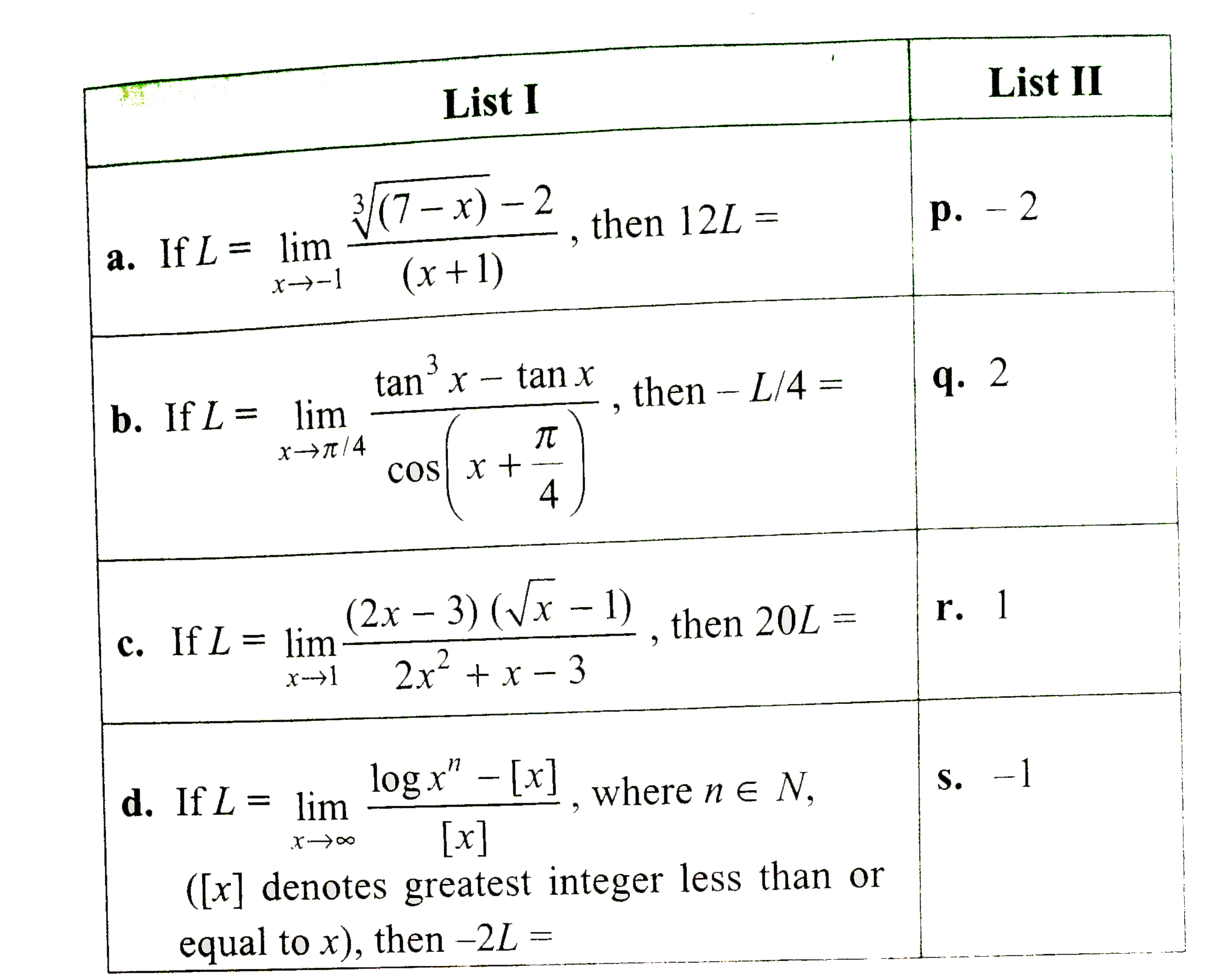If f(x)={x−1,x≥12x2−2,x<1,g(x)={x+1,x>0−x2+1,x≤0,andh(x) =|x|,thenlimx→0f(g(h(x))) is___Solution in Bengali
The correct Answer is:(0)
limx→0+f(g(h(x)))=f(g(0+))=f(1+)=0
limx→0−f(g(h(x)))=f(g(0+))=f(1+)=0
Hence, limx→0f(g(h(x)))=0
Topper's Solved these Questions
- BOOK - CENGAGE PUBLICATIONCHAPTER - LIMITSEXERCISE - Archives JEE MAIN8videos
LIMITS
- BOOK - CENGAGE PUBLICATIONCHAPTER - LIMITSEXERCISE - Archives JEE ADVANCED2videos
LIMITS
- BOOK - CENGAGE PUBLICATIONCHAPTER - LIMITSEXERCISE - Matrix Match Type5videos
LIMITS
- BOOK - CENGAGE PUBLICATIONCHAPTER - JEE 2019EXERCISE - Chapter 108videos
JEE 2019
- BOOK - CENGAGE PUBLICATIONCHAPTER - LINEAR COMBINATION OF VECTORS, DEPENDENT AND INDEPENDENT VECTORSEXERCISE - DPP 1.210videos
LINEAR COMBINATION OF VECTORS, DEPENDENT AND INDEPENDENT VECTORS
Similar Questions
Let f:R→R be a positive, increasing function with
limx→∞f(3x)f(x)=1. Then limx→∞f(2x)f(x) is equal to01:52View SolutionIf limx→0[1+xln(1+b2)]1x=2bsin2θ,b>0andθ∈(−π,π]. then the value of θ is
05:24View SolutionMatch the following lists:
 08:15View Solution
08:15View SolutionIf y = y(x) is the solution of the differential equation, xdydx+2y=x2 satisfying y(1) = 1, then y(12) is equal to
03:04View SolutionThe number of integral values of p for which (p+1)ˆi−3ˆj+pˆk,pˆi+(p+1)ˆj−3ˆk and −3ˆi+pˆj+(p+1)ˆk are linearly dependent vectors is q
09:34View SolutionIf f(x)=1x,g(x)=1x2, and h(x)=x2, then
(A) f(g(x))=x2,x≠0,h(g(x))=1x2
(B) h(g(x))=1x2,x≠0,fog(x)=x2
(C) fog(x)=x2,x≠0,h(g(x))=(g(x))2,x≠0
(D) none of these08:46View SolutionIf f(x)={x−1,x≥12x2−2,x<1,g(x)={x+1,x>0−x2+1,x≤0,andh(x) =|x|,then(lim)x→0f(g(h(x))) is___
02:22View Solutionf(x)=(x+1)(x+2)(x+2^(2))+...+(x+2^(n-1)) and g(x)=lim_(n rarr oo)((f(x+(1)/(n)))/(f(x)))^(n) if f(x)!=0=0 if f(x)=0 then g(0)=
02:34View Solutionf(x)={x-1,-1<=x<=0 and x^(2),0<=x<=1 and g(x)=sin x Find h(x)=f(|g(x)|)+|f(g(x))|.
01:45View Solutiona0fn(x)+a1fn−1(x).g(x)+a2fn−2g2(x)+......+angn(x)≥0
02:35View SolutionLet f(x)={x-1,-1<=x<0 and x^(2),0<=x<=1,g(x)=sin x and h(x)=f(|g(x)|)+[f(g(x)) Then
03:46View SolutionIf f(x)={x−1, x≥12x2−2, x<1,g(x)={x+1, x>0−x2+1, x≤0, and
h(x)=|x|, then limx→0f(g(h(x))) is_______.03:37View SolutionIf f(x)=(g(x))+g(−x)2+2[h(x)+h(−x)]−1 where g and h are differentiable functions then f'(0)
04:24View SolutionIf f(x)=1x,g(x)=1x2, and h(x)=x2, then
(A) f(g(x))=x2,x≠0,h(g(x))=1x2
(B) h(g(x))=1x2,x≠0,fog(x)=x2
(C) fog(x)=x2,x≠0,h(g(x))=(g(x))2,x≠0
(D) none of these02:22View SolutionLet f(x)={x+1,x>0,2−x,x≤0 and g(x)={x+3,x<1,x2−2x−2,1≤x<2,x−5,x≥2 Find the LHL and RHL of g(f(x)) at x=0 and, hence, fin limx→0g(f(x)).
01:26View SolutionIf f(x)={x−1,x≥12x2−2,x<1,g(x)={x+1,x>0−x2+1,x≤0,andh(x) =|x|,thenlimx→0f(g(h(x))) is___
06:09View Solution

